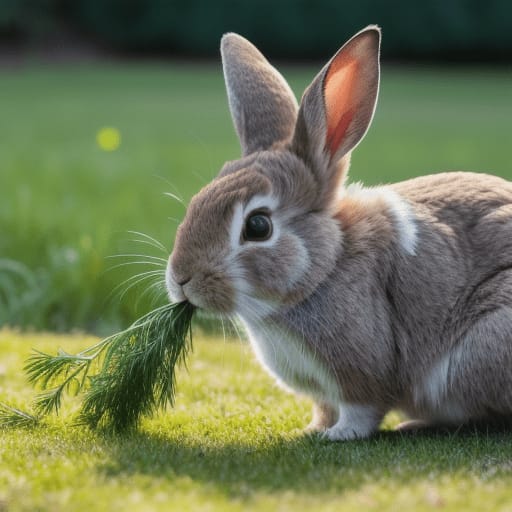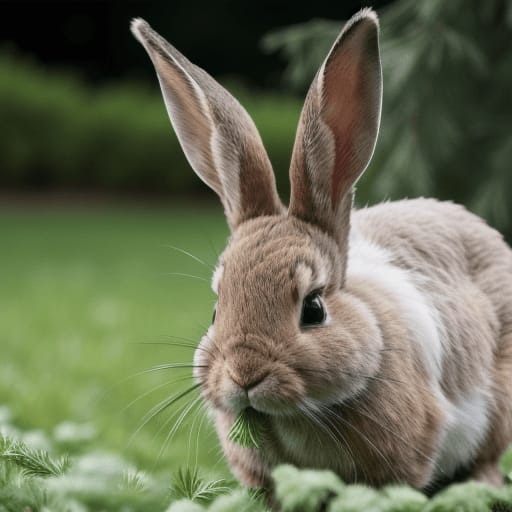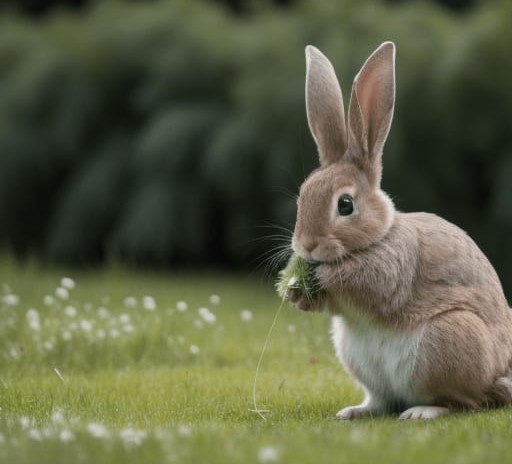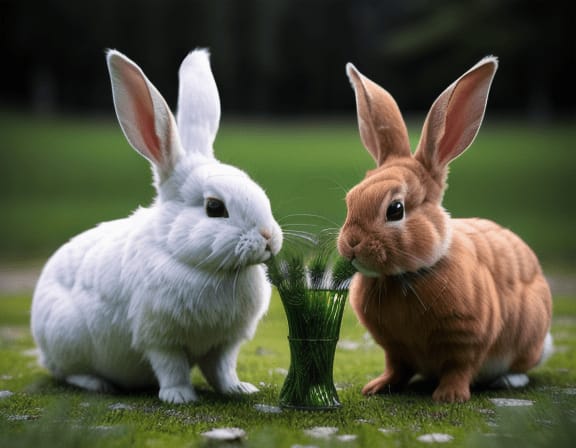Looking for an addition to your rabbit’s diet that’s packed with nutrition and antioxidants?
Look no further than dill!
In this guide, we’ll unpack all there is to know about adding dill to your rabbit’s diet, including why dill provides such positive benefits for your bunny, how frequently you should feed your rabbit dill and more!
Let’s dive in!
Table of Contents
Rabbit’s Herbivorous Diets

Rabbits thrive on herbivorous diets. They need a range of plants for optimal health. It’s not just about carrots and lettuce. Various herbs can add nutritional depth and flavor to your pet’s meals.
Dill is a herb that fits well into rabbit diets. It’s not just safe for them to eat but beneficial, too. From supporting digestion to providing essential vitamins, dill has much to offer.
Rabbit diets should primarily consist of hay. Vegetables and herbs like dill can supplement this. They add variety and nutrients, improving your rabbit’s overall well-being.
Exploring Dill as a Nutritional Component for Rabbits
Let’s look at dill in the context of rabbit nutrition. Dill adds taste, but it’s also packed with nutrients. This makes it a great addition to your rabbit’s meals.
Nutritional Composition of Dill
Expanding on dill’s nutritional composition, it’s not just about fiber and protein. Dill is also packed with various vitamins and minerals that benefit rabbits.
One of these is vitamin A, which supports vision, immune function, and cell growth. Vitamin C is a great antioxidant that boosts your rabbit’s immune system and helps wound healing. Moreover, vitamin K in dill plays a crucial role in bone health and normal blood clotting.
On the mineral front, dill offers calcium and iron. Calcium is integral to strong teeth and bones in rabbits, while iron helps with red blood cell production.
Vitamins, Minerals, and Other Nutrients
Dill contains vitamin A, and vitamin C. Vitamin A is crucial for good vision and immune health. Vitamin C is an antioxidant that protects cells from damage.
Dill also provides minerals. These include calcium for strong bones and teeth and iron for red blood cell production. The blend of nutrients makes dill a beneficial herb for your rabbit’s diet.
Safety Considerations and Precautions

When introducing dill to your rabbit’s diet, safety is paramount. This involves understanding potential allergies, monitoring digestive upsets, and properly controlling portions.
Potential Risk of Allergies
Like any new food, dill could trigger allergies in some rabbits. Symptoms might include unusual lethargy, skin inflammation, or breathing difficulty. Always observe your rabbit carefully when introducing dill. If these symptoms appear, remove dill from the diet and seek veterinary help immediately.
Digestive Upsets
Rabbits have sensitive digestive systems that might get upset by over-consumption of dill. If your rabbit experiences loose stools, bloating, or appears uncomfortable after eating dill, it might indicate too much of the herb in their diet. In such cases, lessen the amount of dill and ensure your pet has plenty of hay and water to support digestion.
Moderation and Portion Control
While dill carries many nutritional benefits, it’s essential to remember that it should only form a small part of a rabbit’s diet. Maintaining moderation and proper portion control ensures your rabbit enjoys dill benefits without experiencing any negative side effects. Let’s delve into some specifics of incorporating dill responsibly into your rabbit’s meals.
Gradual Introduction
Introduce dill slowly into your rabbit’s diet. Start with tiny portions, increasing slowly over weeks. This will help their digestive system to adjust to the new food without causing them any discomfort.
Portion Size
When it comes to serving size, a sprig or two of dill added to their daily vegetable mix is usually enough. This portion is not overwhelming and allows your rabbit to reap nutritional benefits without digestive upset.
Organic and Fresh Dill
Always choose fresh, organic dill to ensure your rabbit’s safety and health. This eliminates the risk of chemical pesticides that could harm your pet. Ensuring the dill is fresh also maximizes your rabbit’s nutritional content and taste, making it a beneficial and enjoyable addition to their diet.
Monitoring Rabbit’s Health and Well-being
Knowing your rabbit’s normal behavior and physical condition is essential to optimal health. Consistent monitoring will help you spot any changes early, allowing timely intervention if needed. Now, let’s discuss some signs showing your rabbit is healthy.
Signs of a Healthy Rabbit
A healthy rabbit has bright and clear eyes, free from discharge. They are lively, eager for meals, and have smooth and clear coats. Noticing changes in these areas can indicate potential health issues, so be alert!
Importance of Regular Health Check-ups
Routine veterinary visits are crucial for rabbit health. Regular check-ups can identify potential health issues before they become severe. It’s also an opportunity to seek expert advice on their diet, including dill.
Benefits of Dill in a Rabbit’s Diet

Dill has an impressive nutritional composition that can greatly benefit your rabbit. But it doesn’t stop there. From aiding digestion to stimulating appetite, let’s dive into the benefits of dill to your furry friend’s diet.
Nutritional Value
Dill is packed with vitamins A, C, and B6. Plus, it offers minerals such as iron, manganese, and calcium. These nutrients support your rabbit’s overall health, making dill an excellent addition to their diet.
Digestive Health Support
Dill can be helpful for your rabbit’s gut health, too. It aids in digestion and alleviates digestive upsets. So, it can contribute to a healthy and happy pet’s stomach!
Appetite Stimulation
Have you ever noticed your rabbit gobbling up dill with enthusiasm? It’s because dill stimulates their appetite. So, if your rabbit seems off food, a bit of dill could be the kick-start they need.
Antioxidant and Anti-inflammatory Properties
Dill is loaded with antioxidants and has anti-inflammatory properties. These can help combat cell damage and inflammation in your rabbit. This way, it nourishes them and protects their health.
How Often Can Rabbits Eat Dill?
Dill can be a great addition to rabbit meal plans. However, it’s essential to know how frequently you should offer dill to your rabbit. Understanding this helps maintain your rabbit’s health and happiness.
Guidelines for Frequency and Quantity
Serving dill is a delicate balance. Offer dill to your rabbit as a daily treat. But here’s the kicker – it should only be a small pinch. The bulk of a rabbit’s diet should still be hay.
Adjusting Based on Individual Rabbit’s Needs
Recognizing your rabbit’s unique needs is paramount. This implies closely observing their response to dill. Watch their behavior and physical reactions, including digestion. If there are any negative signs, consider reducing dill servings. Ultimately, it’s about ensuring your rabbit’s good health.
Conclusion
Understanding your rabbit’s dietary needs can seem overwhelming at first. But remember, every healthy rabbit’s diet includes dill because the benefits of dill in a rabbit’s diet are multifold. It’s a nutritional powerhouse and a tasty treat for your furry friends.
Safety is crucial when introducing new foods. Start slowly with a dill, watch for any signs of allergies, and always opt for fresh organic dill. It’s about whether rabbits can eat dill and how they should consume it for optimal health.
Regular check-ups are vital to ensure your bunny is thriving and enjoying their meals, including their newfound love for dill. Ultimately, it’s about keeping your pet friend healthy.
FAQs
Is dill leaves good for rabbits?
Dill is excellent for rabbits. It’s a rich source of fiber, which aids in maintaining a healthy digestive system for rabbits. Also, it contains essential nutrients like vitamins A, C, and K, providing numerous health benefits.
What are the key benefits of dill in a Rabbit’s diet?
Dill in a rabbit’s diet aids digestion, boosts immune function, maintains dental health, and controls weight due to its low calories. It also provides antioxidants for overall health and offers a tasty treat for dietary variety.
What is the function of dill?
Dill serves many functions. It’s a culinary herb and a nutritious plant that aids digestion and provides essential nutrients. Rabbits benefit from fiber, vitamins, and minerals, supporting their immune system and digestion.
Are any leaves poisonous to rabbits?
Yes, some leaves can harm rabbits. Certain plants, like rhubarb, potato plants, and tomato leaves, are toxic for rabbits and should be avoided. Always ensure you know the safety of any new food you introduce to your rabbit’s diet.
Can rabbits eat dill stalks, too?
Yes, rabbits can eat dill stalks. It’s safe but beneficial for their health. Dill, especially its stalks, is high in essential nutrients like vitamins A and C, which can benefit a rabbit’s overall health and well-being.
Alina Hartley is a small-town girl with a ginormous love of bearded dragons. It all started with Winchester, a baby bearded who was abandoned at the shelter by his former owners because of a birth defect that caused one front leg to be shorter than the other. Alina originally went to the shelter looking for a guinea pig, but one look at Winchester and it was love at first sight. From that day on, Alina has dedicated her life to learning everything she can about bearded dragons. She loves helping new beardie parents start their incredible journey with these magnificent reptiles.
Follow her on:
LINKEDIN
TWITTER.
Read her latest articles HERE
Learn more about her HERE.

